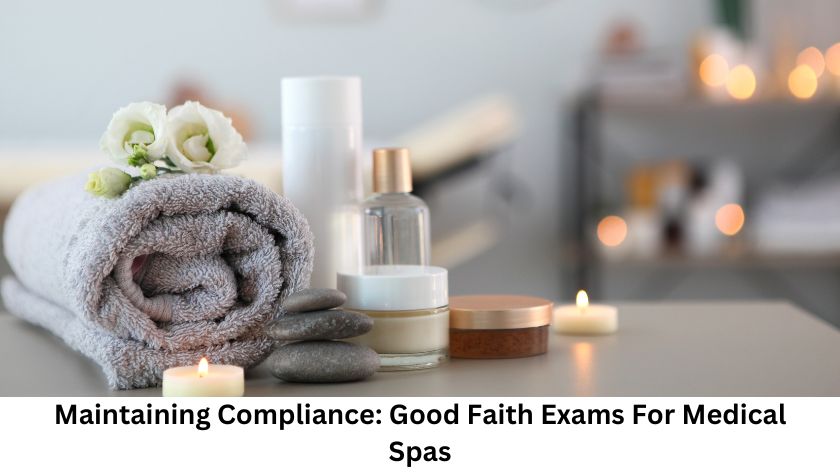Maintaining Compliance: Good Faith Exams For Medical Spas

Good faith exams are critical evaluations conducted by healthcare professionals before proceeding with any medical treatment or procedure. In the context of medical spas, these exams ensure that each treatment is appropriate for the patient’s specific conditions and needs. The process typically involves a thorough assessment of the patient’s medical history, current health status, and any potential risks associated with the proposed treatments. This foundational stage not only safeguards the patient but also fortifies the medical spa’s commitment to med spa regulatory compliance and ethical standards.
Med Spa Compliance Solutions
Integrating Good Faith Exams
Integrating good faith exams into the med spa compliance protocols of a medical spa is a crucial step towards ensuring overall compliance with health regulations. These protocols should detail the steps and criteria for conducting these exams, specifying who should perform them, how they should be documented, and what outcomes should trigger further action. By formalizing this process, medical spas can ensure consistency and reliability in their compliance efforts.
Utilizing Technology for Compliance
Technology can greatly enhance the efficiency and effectiveness of med spa compliance solutions. Implementing electronic health records (EHRs) and other digital tools can help streamline the process of conducting good faith exams by making patient information more accessible and easier to update. This technology can also facilitate better communication among staff members and ensure that all necessary documentation is complete and easily retrievable for audits.
Benefits of a Comprehensive Compliance Plan
Developing a comprehensive compliance plan that includes med spa compliance best practices is essential for any medical spa aiming to uphold high standards. Such a plan should contain not only good faith exams but also other critical areas like patient privacy and emergency procedures. A well-rounded approach ensures that every aspect of the spa’s operations is covered, reducing the risk of non-compliance and enhancing the overall safety and quality of care provided to patients.
Best Practices for Med Spa Compliance
Thorough Patient Assessments
Effective med spa compliance strategies involve conducting thorough patient assessments. This means going beyond the basic requirements of good faith exams to include a comprehensive analysis of a patient’s overall health, lifestyle, and aesthetic goals. By deeply understanding the individual circumstances of each patient, medical spas can tailor treatments that are not only effective but also safe.
Accurate Documentation Practices
This is critical in maintaining med spa compliance standards and ensuring that all medical interventions are well recorded. This can help protect the medical spa in legal situations and ensure continuity of care for the patient. Here are key elements that should be included in every patient’s documentation:
- Patient Identification Information: Each patient’s file should start with comprehensive identification information, including the full name, date of birth, and contact details. This ensures that each patient’s health records are accurately linked to them, avoiding any mix-ups that could lead to incorrect treatments or breaches of privacy. It also facilitates efficient communication and coordination with the patient for appointment scheduling and emergency contacts.
- Medical History: A detailed account of the patient’s past and current medical conditions, surgeries, and any relevant family medical history is crucial. This information provides a foundational understanding of the patient’s overall health and potential risk factors, influencing treatment decisions and preventive health strategies. Documenting medical history meticulously helps in foreseeing complications and customizing treatments that are safe and effective for the individual patient.
- Consent Forms: Each patient must sign consent forms that document their understanding of the risks and benefits associated with the treatments they are considering. These forms should be detailed, explicit, and stored securely. This process not only fulfills legal requirements but also reinforces ethical standards by ensuring that patients are making informed decisions about their health care.
- Treatment Records: Detailed notes should be maintained on the type of treatments administered, the dosages used (if applicable), and the patient’s response to each treatment. These records are vital for monitoring progress and adjusting future treatments. They also serve as a legal document that can be referenced in case of any disputes or audits.
- Follow-up Care Instructions: Post-treatment care instructions and information about scheduled follow-up visits should be documented and communicated to the patient. This ensures that the patient understands their role in the recovery and maintenance phases, which is critical for the success of the treatments administered. Proper follow-up care documentation supports patient engagement and adherence to therapeutic protocols, enhancing treatment outcomes.
Maintaining meticulous records is not just about compliance; it’s about ensuring that each patient’s care pathway is transparent and traceable. This practice not only supports ethical medical practices but also enhances patient confidence in the safety and professionalism of the spa.
Strategies for Leveraging Good Faith Exams
Building Patient Trust and Confidence
The implementation of good faith exams in medical spas significantly contributes to building trust and confidence among patients. When clients see that a spa takes every precaution to ensure treatments are suitable and safe, their trust in the facility grows. This trust is crucial for retaining clients and encouraging them to undergo recommended treatments, knowing they are backed by thorough assessments and professional integrity. Trust also facilitates more open communication between patients and providers, leading to better outcomes and increased patient satisfaction.
Identifying Health Risks
These exams help in detecting underlying conditions that may contraindicate certain procedures, thus safeguarding the patient from adverse effects. By ensuring that all treatments are appropriate for the patient’s current health status, medical spas uphold a high standard of care, reducing liability risks and enhancing overall treatment efficacy.
Enhancing Transparency and Accountability
Leveraging good faith exams means maintaining meticulous records that detail every aspect of the patient consultation and treatment process. This not only helps in tracking the effectiveness of treatments but also in providing clear evidence of compliance with all applicable regulations and standards. Increased accountability leads to better operational practices.
Future of Compliance in Medical Spas
Evolving Regulatory Landscapes
As new laws and regulations are introduced, medical spas must update their compliance strategies to remain in good standing. This includes revising med spa compliance strategies to accommodate new health and safety requirements, changes in privacy laws, or adjustments in licensing provisions. Staying ahead of these changes not only ensures legal compliance but also demonstrates a commitment to the highest standards of patient care and industry leadership.
Long-term Strategies for Sustainable Compliance
These strategies contain more than just adherence to immediate regulatory requirements; they involve a forward-looking approach to anticipate and adapt to future challenges and opportunities in the industry. Here’s an exploration of the key strategies:
- Partnerships with Experts: Building strong relationships with legal and compliance experts is essential for medical spas aiming to navigate the complex regulatory landscape effectively. These partnerships ensure that the spa is always ahead of legal changes and compliance updates. Regular consultations with experts help in interpreting new laws and understanding their implications for the spa’s operations.
- Continuous Staff Education: Investing in the continuous education of staff is crucial for maintaining high standards of service and compliance. This includes regular training sessions on the latest medical procedures, customer service excellence, and updates on health and safety regulations. By empowering staff with up-to-date knowledge and skills, medical spas ensure that their team is competent and confident in meeting the demands of the industry. Ongoing education fosters a culture of excellence and compliance, which is vital for the reputation and longevity of the business.
- Technological Updates: Regular updates and upgrades of medical equipment and management software help in maintaining accuracy in treatments and efficiency in operations. Implementing the latest technology not only aids in meeting the evolving compliance standards but also enhances the overall patient experience.
Adopting these long-term strategies enables medical spas to not just respond to immediate compliance requirements but to also position themselves strategically for future developments. This proactive and structured approach is vital for building a resilient and thriving business in the competitive medical spa industry.
The importance of good faith exams compliance within medical spas cannot be overstated. These exams are more than just a procedural formality; they are a fundamental practice that protects patients and clinics alike by ensuring that every treatment decision is informed, ethical, and compliant with health standards. Prioritizing these exams demonstrates their dedication to ethical patient care and integrity in medical spas, which are crucial for building trust and maintaining a reputable standing in the community.




